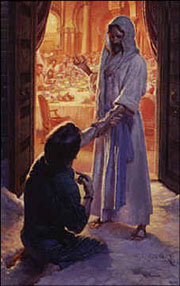Woe to you!
In tomorrow's Gospel reading Jesus gives a group of blessings followed by a group of woes. He tells his disciples:
 So what do we do with these words of Jesus? This sermon of his must have resonated deeply with those first disciples and then with the persecuted early church. They were (in many cases) poor, hungry, and mourning. They were certainly persecuted for their faith. But now we are relatively rich, positively full, laughing and generally well thought of. How do we hear these words now? How do we do more than shrug our shoulders and move on to the parts of the Gospel we like?
So what do we do with these words of Jesus? This sermon of his must have resonated deeply with those first disciples and then with the persecuted early church. They were (in many cases) poor, hungry, and mourning. They were certainly persecuted for their faith. But now we are relatively rich, positively full, laughing and generally well thought of. How do we hear these words now? How do we do more than shrug our shoulders and move on to the parts of the Gospel we like?
I've been praying about this in preparation for the sermon tomorrow and if you think and pray about it a bit too, I wonder what God will do. Rather than jumping to the answer, consider how these passages of blessings and woes may apply to you. Tomorrow I'll share what I found in Bible study and prayer in this space. But I know that what God shares with you in the meantime as you prayerfully consider these words for yourself is likely to be more meaningful than what I will have to preach in the morning.
peace,
Frank+
The Rev. Frank Logue, Pastor
Blessed are you who are poor,Bass Mitchell has said of this passage,
for yours is the kingdom of God.
Blessed are you who are hungry now,
for you will be filled.
Blessed are you who weep now,
for you will laugh.
Blessed are you when people hate you, and when they exclude you, revile you, and defame you on account of the Son of Man. Rejoice in that day and leap for joy, for surely your reward is great in heaven; for that is what their ancestors did to the prophets.
But woe to you who are rich,
for you have received your consolation.
Woe to you who are full now,
for you will be hungry.
Woe to you who are laughing now,
for you will mourn and weep.
Woe to you when all speak well of you, for that is what their ancestors did to the false prophets.
In those days people tended to see illness, poverty, suffering as signs of God's displeasure, of sin. Likewise, having wealth and prosperity were signs of God's favor. But Jesus, as usual, turns it all around. Poverty is no barrier to God and God's. Indeed, often the poor are the very ones most open to trusting in God. And prosperity is no sign of divine favor, either, but a very strong temptation to place trust in it rather than God.Methodist Bishop William Willimon has said with some disapproval that, "In our preaching, Jesus is worked over into one who always blesses and never condemns."
 So what do we do with these words of Jesus? This sermon of his must have resonated deeply with those first disciples and then with the persecuted early church. They were (in many cases) poor, hungry, and mourning. They were certainly persecuted for their faith. But now we are relatively rich, positively full, laughing and generally well thought of. How do we hear these words now? How do we do more than shrug our shoulders and move on to the parts of the Gospel we like?
So what do we do with these words of Jesus? This sermon of his must have resonated deeply with those first disciples and then with the persecuted early church. They were (in many cases) poor, hungry, and mourning. They were certainly persecuted for their faith. But now we are relatively rich, positively full, laughing and generally well thought of. How do we hear these words now? How do we do more than shrug our shoulders and move on to the parts of the Gospel we like?I've been praying about this in preparation for the sermon tomorrow and if you think and pray about it a bit too, I wonder what God will do. Rather than jumping to the answer, consider how these passages of blessings and woes may apply to you. Tomorrow I'll share what I found in Bible study and prayer in this space. But I know that what God shares with you in the meantime as you prayerfully consider these words for yourself is likely to be more meaningful than what I will have to preach in the morning.
peace,
Frank+
The Rev. Frank Logue, Pastor







1 Comments:
At 2/12/2007 7:57 AM, Anonymous said…
Anonymous said…
I look forward to reading this sermon online. Wish I could be there to hear it.
Robin Rapp
Post a Comment
<< Home